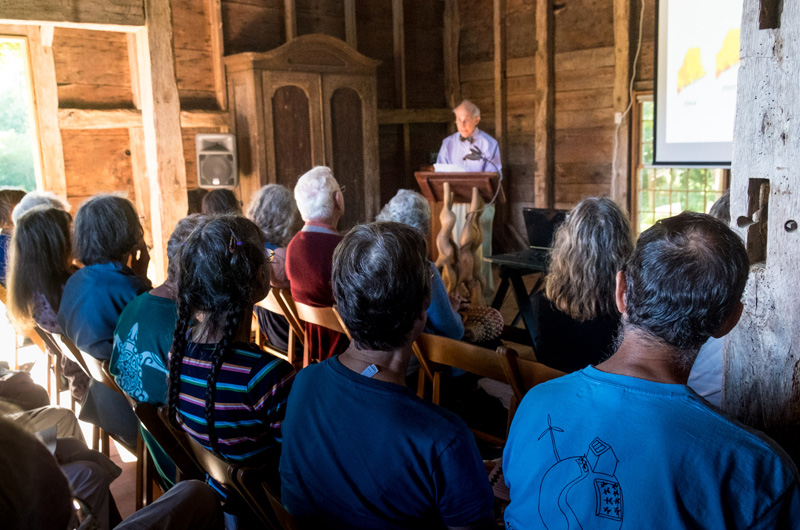Nobel laureate and physician Dr. Eric Chivian knows that despite its unit of measure, temperature is not just a matter of degree. He illustrated this point with regard to the effects of global warming on human health during a talk given on Wednesday at Polly Hill Arboretum.
Dr. Chivian said that just as an infant who is brought to the hospital for a fever will promptly receive antibiotics, similarly swift action must apply to the earth as global average temperatures rise.
“The risks of inaction and delay are so enormous, so potentially catastrophic for the planet... that to wait to act until we have absolute proof, absolute certainty of what will happen, is to take a risk with the physical, chemical and biological systems of this planet, to do, in essence, a global experiment with our own health and our lives,” he said.
Dr. Chivian extended his medical approach to understanding global climate change through two case studies.

In a close-to-home example, he discussed Lyme and other tick borne diseases. Dr. Chivian said Lyme is currently the most common vector-borne disease in the United States, with some figures estimating over 300,000 cases each year.
Lyme disease is spread by ticks that carry the bacterium Borrelia burgdorferai. Many animals that ticks bite, including humans, are incompetent, or dead-end, hosts for the bacteria that causes Lyme, meaning these hosts cannot transmit the bacteria back to ticks. Biodiversity therefore helps to dilute the presence of B. burgdorferai in a given area.
Deforestation, however, has led to reduced biodiversity and as a variety of animals, including predators, lose their habitats through forest fragmentation, the population of one particularly important competent host, the white-footed mouse, has flourished.
All these factors have led to an increase in tick borne illness in humans. Dr. Chivian cited a statistic that documented a 10-fold increase in Lyme cases in Maine from 2004 to 2009.
The issue resonated with the audience of over 100. Dr. Chivian asked how many had Lyme or knew of someone who had the disease, and nearly every hand went up.
Polar bears offered another example of the medical imperative to take action to protect the environment. Despite remaining immobile for five to seven months during hibernation, polar bears do not get osteoporosis. Their bodily functions are also put on hold, “and yet, they don’t become dehydrated, don’t starve, and don’t get sick from not urinating... If we don’t urinate for a few days, we die.”
Dr. Chivian said that through the study of hibernating polar bears in the wild, researchers might gain insight that could help develop treatments for diseases like kidney failure and osteoporosis.
But global climate change has led to the thinning of the Arctic ice sheet, which has made it harder for polar bears to capture seals, their main source of sustenance. This puts them at risk of extinction, which threatens future study of the species.
Dr. Chivian encouraged attendees to organize for the environment and to reach out to institutions and politicians on the issue. Brendan O’Neill, executive director of the Vineyard Conservation Society, which cosponsored the talk with the arboretum, said, “Depending on our ability as a society, as a country, to rein in fossil fuel emissions and other greenhouse gases, Martha’s Vineyard could see a climate similar to that of the Carolinas in three short decades.”
Mr. O’Neill continued: “As the arboretum staff knows, our USDA plant hardiness zone map is rapidly changing as well. Pernicious invasive species are migrating north and competing with our native flora. Tickborne disease is epidemic, and more high heat days will have profound implications for fire risk, for water quality, and for the stability of our food supply.”
Dr. Chivian pointed to a number of the striking phenomena recorded over the course of a global average temperature increase of two degrees Fahrenheit since 1880: increased extreme weather events, global ice melting, including a trillion-ton iceberg that recently broke off the Larsen sea ice sheet in the Antarctic, coastal flooding and species extinction.
“If we don’t reverse the course we are on, we are talking about a world I believe we would have trouble recognizing,” he said.
He noted, however, that at present it can be a challenge to perceive global environmental changes. Some, he added, prefer not to think about the disturbing issue. He also said that climate change is often discussed in difficult-to-understand, technical terms. And so Dr. Chivian puts the threat in terms that speak to the public, by framing the conversation in terms of health.
One attendee, Keith McGuire, suggested other reasons to protect the environment. “Everything has a right to exist of its own self, and we should never forget that,” he said. “One of the problems that makes us humans destroy the earth and create global warming is that we don’t have a connection to nature and we feel alienated from nature.”
Dr. Chivian said he strongly agreed with Mr. McGuire. As a psychiatrist, he spends much of his career grappling with this very issue, and explained the self-interested approach as a pragmatic one. “I feel that many people, maybe most people, will only change when they feel they have no other choice.”
“Maybe there’s a way of doing both... to keep that reverence and belief that other organisms have as much right to exist as we do, and we are stewards of the environment, not controllers of it. The environment, it doesn’t exist for us, or, for us alone.”




Comments
Comment policy »